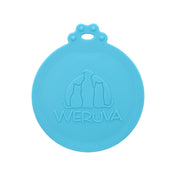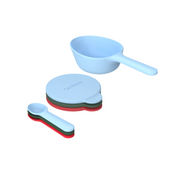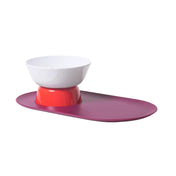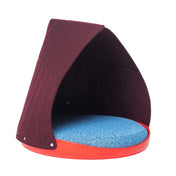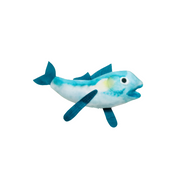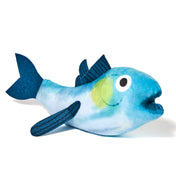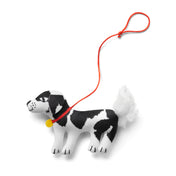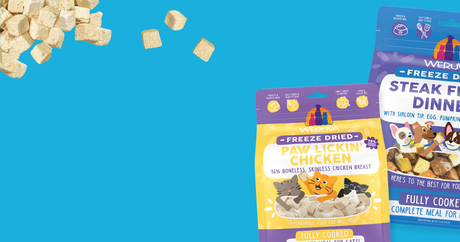Frequently Asked Questions
Nutritional Information
Weruva provides thorough nutritional profiles on all of our products online. Click Cat Nutritional Information or Dog Nutritional Information to view our product pages and access a comprehensive nutritional profile for the recipe you’re interested in.
Why Weruva
We, Stacie and David Forman, founded Weruva in 2006 and named the company after our three rescued cats . . . WEbster, RUdi, and VAnessa. We have since adopted many furry friends, including Baron, Harry, Baila, Louie and Bijoux (all chihuahua mixes)...and also Monti, Gretchen and Strudel (kitties).
It means our company is owned by real people who seek to feed your pets exactly the way we feed our own. It means that when you want more from your pet’s nutrition, we act on it, personally. In fact, wanting more is exactly what drove us to start Weruva in the first place!
Four points distinguish Weruva from other pet food brands:
1. Carnivorous focus
Cats and dogs are part of the carnivora family, and Weruva was formulated with this in mind. Calories for pets and people come from three places: protein, fat and carbohydrates. The calories from meat are comprised of protein and fat with minimal if any calories coming from carbohydrates. In that regard, cats and dogs need protein and fat whereas cats and dogs do not need carbohydrates. For both cats and dogs, carbohydrates are not metabolically necessary and should be kept to a minimum. Cats are “obligate carnivores” which means they are obligated to and must eat meat to survive. Dogs may be able to adapt to an omnivorous diet, meaning, some dogs can handle carbohydrates, but others cannot. All of our foods are formulated with the carnivore in mind, with the percentage of carbohydrates in most formulas ranging from approximately 1% to 3%.
2. Protein fit for human consumption
All Weruva cat food and dog food is produced in a human food facility according to international human food processing standards. We call these formulas our “human style” products because all formulas conform to standards for human consumption including ingredients such as boneless, skinless, white chicken breast and fish loins flaked off the bone. Our protein ingredients are the same exact ingredients used in products for people around the globe – our pets do not get the leftovers. Our furry friends get the same cuts, and we process the food under the same standards as human food.
3. Human food standards
We craft our foods in a state-of-the-art human food facility that caters to many international customers. Each country that our factory ships to has its own processing standards. Arguably the strictest standard is the BRCGS ((Brand Reputation through Compliance Global Standard),recognized as one of the most rigorous benchmarks for good manufacturing practices.
4. Identifiable ingredients and paté the Weruva way (i.e. No mystery mush)
We DON’T blend our ingredients into machine-shaped chunks or unidentifiable loaves. Instead, we flake our protein cuts off the bone, which are then hand-placed into our packaging along with other food ingredients in the recipe. Our philosophy is “what you see is what you get” – we want you to see and identify the quality of the ingredients that we list on the ingredient statement. When it came to patés, we use the exact same ingredients as found in our cans like boneless, skinless chicken breast, and gently purée them into a hydrating paté.
Chicken is a staple in many of our human diets. What if, after ordering a chicken dinner in a restaurant, the server brought out a platter of nearly-bare chicken bones?
In the pet food world, we call this the “chicken trick”. According to AAFCO (Association of American Feed Control Officials), poultry is the “clean combination of flesh and skin with or without accompanying bone.” Though “chicken” in pet food may indeed be what we expect it to be, it could just as easily be a plate of bones.
At Weruva, you can take comfort in the fact that the cut of chicken we use is boneless, skinless white breast meat.
Our “human-style” foods are made in Thailand in facilities that also make food for people – in fact, much of the people food goes to the US, EU, Australia and Japan.
Thailand is a world leader in producing foods for people (and in our case, pets) around the globe. We choose to make our food in Thailand because of their close partnerships with us and their ability to meet our stringent manufacturing standards. Furthermore, we strive to be a sustainable business partner by working to protect both the earth’s resources and the living beings that inhabit it. By being diligent with best business practices and maintaining the global standard certifications we hold, we manage each step in our supply chain with ethical and sustainable practices.
The BRCGS is a leading global brand and consumer protection organization. The BRCGS provides a framework to manage product safety, integrity, legality, and quality, and the operational controls for these criteria in the food and food ingredient manufacturing, processing, and packing industry for both human food and pet food. Although the BRCGS food safety standard began in the UK, it is now recognized as one of the most rigorous benchmarks for good manufacturing practices.
Product Questions
Tightly sealed cans, cups or pouches can last 3-4 days in the refrigerator.
Our manufacturing partner utilizes a high quality raw material that is fit for use in products for people in the United States and the strict European Union.
The inner lining of Weruva's 2.8oz, 3.0oz, 5.5oz,and 6.0oz cans are free of BPA and other epoxodized resins. On the 10.0 oz can and 14.0 oz can, it is a little different. If you look on the inside of a can of this size compared to a smaller can, you will note that there is an inner seam. The smaller cans can be made on one sheet whereas a couple of pieces are used on the larger sizes. Where the pieces are fused together typically must have some sort of stronger lining so as to protect the food from the can and can from the food, and BPA is used there. The rest of the lining is BPA free.
The pouches are made from polymer plastic with an aluminum lining, and they are BPA free.
The cups are made from plastic and are also BPA free.
Chicken
The chickens we use are raised in a cage-free, climate-controlled environment in Thailand. They are raised indoors, allowing for greater control over their non-GMO diet, and making it easier to monitor their health and well-being. The chickens we source are part of an Animal Welfare Standard, meeting ethical treatment guidelines that help protect livestock and cattle at the farm, during transport and at the time of processing.
Beef and Lamb
Raised in Australia and New Zealand, beef and lamb are grass-fed as per strict regulations pertaining to the humane treatment of animals.
Fish
All fish, with the exception of tilapia and basa, are wild-caught. Along with the catch, there are certifications from the ships’ captains that the catches are dolphin- and turtle-safe. The organization Earth Island Institute looks to protect the environment and maintain fishing sustainability, and Earth Island Institute recognizes the practices of our manufacturing facility.
Vitamins & Minerals – These are sourced from Europe and Asian countries (not including China).
Pumpkin – The pumpkin in our formula is sourced from farms local to our plant in Thailand.
Weruva pouches and cups are both BPA free and repurposed! Visit our We Ru Cycle page for more information on how you can repurpose your Weruva pouches and cups.
Feeding Instructions
Figuring out how much to feed takes some trial and error. Our labels recommend feeding 1 ounce per pound of body weight, but this is just a … well, a guideline. We don’t believe in counting calories for cats as there really is no correct caloric amount. Unlike dogs, cats that are eating the right foods are good at self-regulating their food intake.
Calories can come from three sources: protein, fat and carbohydrates. Cats are “obligate carnivores” which means they require or are “obligated” to eat meat. The calories that come from meat are protein- and fat-based, with minimal if any calories coming from carbohydrates. So while cats need protein and fat, carbohydrates are not metabolically necessary. Foods should therefore primarily contain meat (the vast majority of calories coming from protein and fat, and minimal to zero calories coming from carbs). Dry kibble cannot be made without carbs, and carb consumption can potentially lead to weight management issues.
With that said, all of our foods are formulated with the obligate carnivore in mind. With a focus on food quality as opposed to calories, we generally advise that as long as a cat is eating the right foods, let them eat as much as they want. It may take a cat a bit to get used to this style of feeding, but once on a routine that works, cats will naturally get to a comfortable weight eating the right foods, whether that means weight gain or weight loss.
On our food labels we suggest to “Feed according to the age, size, and activity of your cat. If fed alone, feed 1.0oz for each pound of body weight daily. Your cat should have access to clean, fresh water. Refrigerate after opening.”
Cats generally require around 200-250 calories per day, and this largely correlates with 1oz per pound of bodyweight per day total (best fed throughout the day) …But mostly, it comes down to trial and error. We do not believe in counting calories for cats as there really is no correct caloric amount. Unlike many dogs, cats that are eating the right foods will more or less know when it is time to stop eating…the key being that they are eating the right foods…and that would be food with high quality protein and fat found in wet food products as opposed to dry kibble which contains carbohydrates.
The majority of our recipes for cats and dogs meet the nutritional standards of AAFCO to be a complete and balanced meal. Exceptions are Pumpkin Patch Up! pouches and Wx Phos Focused (which is complete and balanced but for phosphorus levels being too low per AAFCO)
Despite how much your cat or dog asks for Weruva’s high-quality foods, it’s best to transition them gradually onto a new food over the course of one week. Start by mixing a small amount of Weruva in with their old food and slowly increase the proportion of Weruva over 7 days to help your pet adjust.
We do offer a line of kitten food. The vast majority of our line is formulated to meet the needs of adults. Though our formulas were not specifically designed for kittens or puppies, all are suitable for feeding…just not as the only part of the diet.
Our cat food and dog food can be fed to both dogs and cats on an intermittent basis. The primary difference is that we add taurine to the cat food but not to the dog food as well as variations on vitamin and mineral amounts. The foods may be fed on an intermittent basis only.
On our wet food labels we suggest to “Feed according to the age, size, and activity of your dog. If fed alone, feed 1.0oz for each pound of bodyweight daily.” Ideally, figuring out how much to feed your unique pup comes down to trial and error, but it is great to have a starting point.
To find your starting point there is a formula called the “Resting Metabolic Rate” which calculates how much a dog should eat just to survive. The formula is:
RMR = 70 + (weight in kg x 30)
Then there are “multipliers” that can be added on to better target your dog’s needs.
Maintenance 1.6
Weight Loss 1
Weight Gain 1.7
Active 2
Highly Active 3
Working Dog 6
Health Questions
Many veterinarians suggest focusing on four primary areas to help the kidneys:
-
High Moisture Intake - Weruva foods contain high moisture levels.
-
Low Phosphorus - Our bone free approach allows for our complete and balanced meals to contain sodium and phosphorus levels just above AAFCO minimums. Our Wx line’s phosphorus levels are too low to be considered complete and balanced.
-
Low Sodium - Many formulas are just above AAFCO minimum levels for sodium
-
High Quality Proteins - Kidneys filter the waste from proteins, so we focus on high quality proteins such as boneless, skinless chicken breast and fish loins
Our foods, though not designed to prevent or treat the kidneys, check those boxes and have been helpful for some kitties with renal issues.
For cats with urinary tract issues or crystals, many vets suggest focusing on two areas:
-
High Moisture - As with kidney difficulties, high moisture in Weruva food keeps toxins diluted and cats hydrated, which can alleviate urinary tract issues.
-
High Quality Meat - As obligate carnivores, cats must eat meat, and quality meat helps promote healthy urinary pH levels. The proper urinary pH for cats skews slightly acidic which, along with appropriate hydration, may help prevent crystal formation.
Diabetes is caused by the body’s inability to produce the requisite insulin to balance blood sugar levels. Carbohydrates are made of sugars, and keeping carbohydrate intake in check can help with diabetes.
Calories for people and pets come from three places: protein, fat and carbohydrates. Cats are “obligate carnivores” which means they must eat meat. Protein and fat are the proper fuel for cats; carbohydrates are not metabolically necessary.
All of Weruva’s cat recipes were formulated with the carnivore diet in mind, ranging from 1-3% carbohydrates.
Calories for people and pets come from three places: protein, fat and carbohydrates. If you look at the calories in meat, they are protein- and fat-based with minimal if any calories coming from carbohydrates. Both cats and dogs require protein and fat, but not carbohydrates.
At Weruva, we formulate our foods with the carnivore in mind. This means more meat which in turn means the vast majority of calories come from protein and fat. A protein- and fat-based focus with limited carbohydrates helps promote healthy weight management.
Fish will have some level of mercury, and we do test for mercury, histamines and polychlorinated biphenyl (PCB). Yet, not all fish were created equally. In a nutshell, the lower on the food chain, the younger and smaller the fish, the less mercury the fish will have. We use fish that meet the FDA’s list of those lower in mercury. There are many species of tuna, some of which have high levels of mercury; we use skipjack, a smaller and younger species that has lower levels.
Good to Know
At Weruva, we believe in rescuing and adopting pets and make it our mission to help animals in need find their forever homes. We are proud to support non-profit organizations that share this commitment as well as those that work for the health and well-being of pets.
We would love for all pet parents, dogs and kitties out there to get a free sample of our food. However, based upon the number of requests we receive, unfortunately, we cannot send them out. Contact our customer service team to inquire about any promotions or coupons that may be available in your area.
We have a 100% guarantee on our products, so in the event your dog/cat tries out a flavor and isn’t pleased, or you are not satisfied for any reason, you can return open or unopened cans, pouches, or cups to the place of purchase for a refund/credit.
There are several ways to contact us!
Email: info@weruva.com
Phone: 1-800-776-5262
Snail Mail: 17 Mercer Road
Natick MA, 01760
For all things Weruva go to weruva.com
Weruva products can be found in specialty pet retailers as well as online. To search for retailers near you, go to our Where To Buy page. (Please call ahead to ensure your product choice is available.)
Online Orders
We offer a variety of convenient payment options, including major credit cards such as Visa, MasterCard, American Express, and Discover. Additionally, we accept Shop Pay for a seamless and secure checkout experience.
To apply a promo code to your order, simply enter the code during the checkout process in the designated promo code or discount field. The discounted amount will be reflected in your total before completing the purchase.
Unfortunately, once an order is placed, it cannot be canceled or edited. Please double-check your order before completing the purchase. To further discuss, please contact our Customer Service Team at info@weruva.com, or send us a message through our Contact Us page.
If your order has not yet shipped, contact our Customer Service Team at info@weruva.com, or send us a message through our Contact Us page to request a shipping address change. Once shipped, address changes may not be possible.
We're here to assist you with any questions or concerns. You can reach our Customer Service Team at info@weruva.com, or send us a message through our Contact Us page. We're here to assist you with any questions or concerns.
Please contact our Customer Service Team at info@weruva.com, or send us a message through our Contact Us page with your order number and photos of the damaged items. We'll work to resolve the issue promptly.
Shipping & Returns
Orders over $60 qualify for free shipping, while orders under $60 incur a flat rate of $7.99. For more details, please review our Shipping Policy.
Currently, we ship to the contiguous 48 states. We do not ship to Alaska, Hawaii, or PO boxes. For more details, please review our Shipping Policy.
If your tracking indicates delivery, but you haven't received your order, please first check with neighbors or your local post office. If the issue persists, contact our Customer Service Team at info@weruva.com, or send us a message through our Contact Us page.
We offer free returns within 30 days of the delivery date. For more details, please review our Return Policy.
To initiate a return or exchange, please contact our Customer Service Team at info@weruva.com or visit our Contact Us page. For more details, please review our Return Policy.

